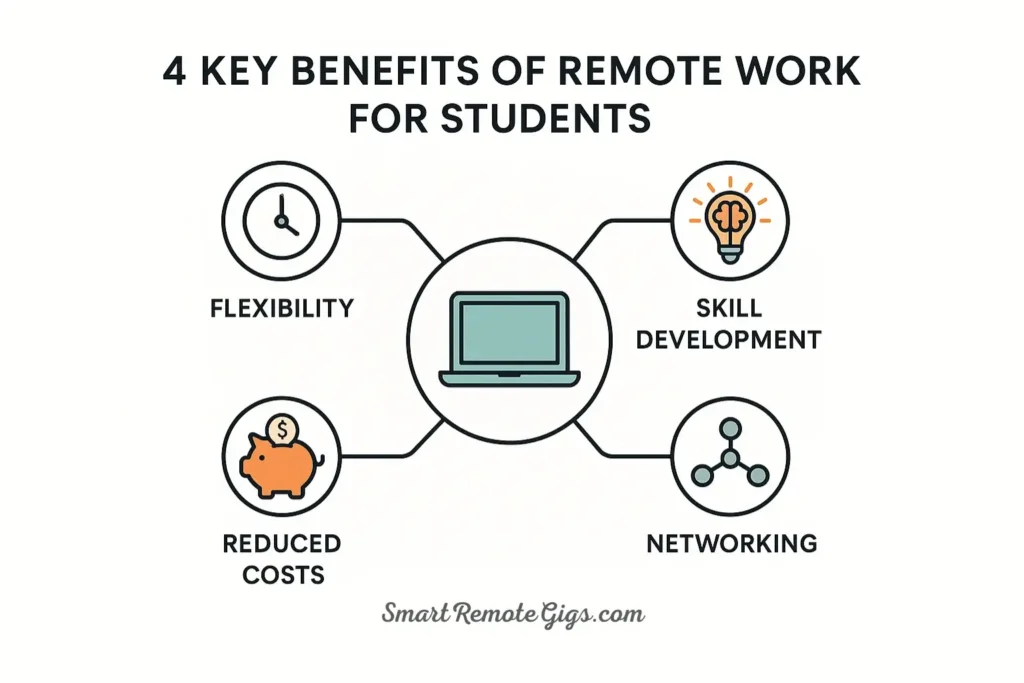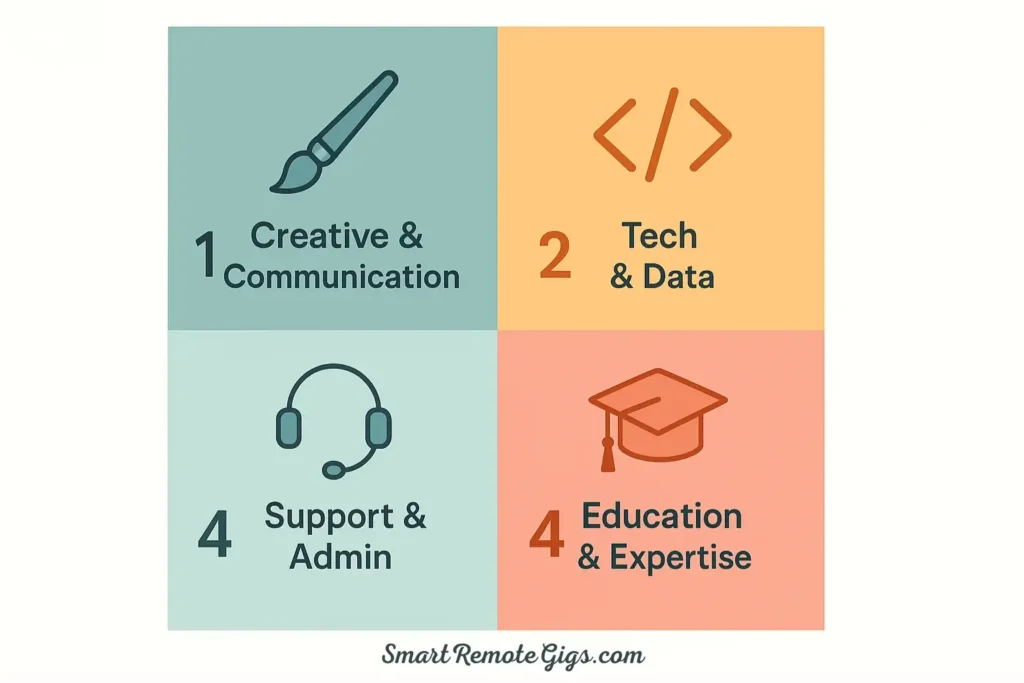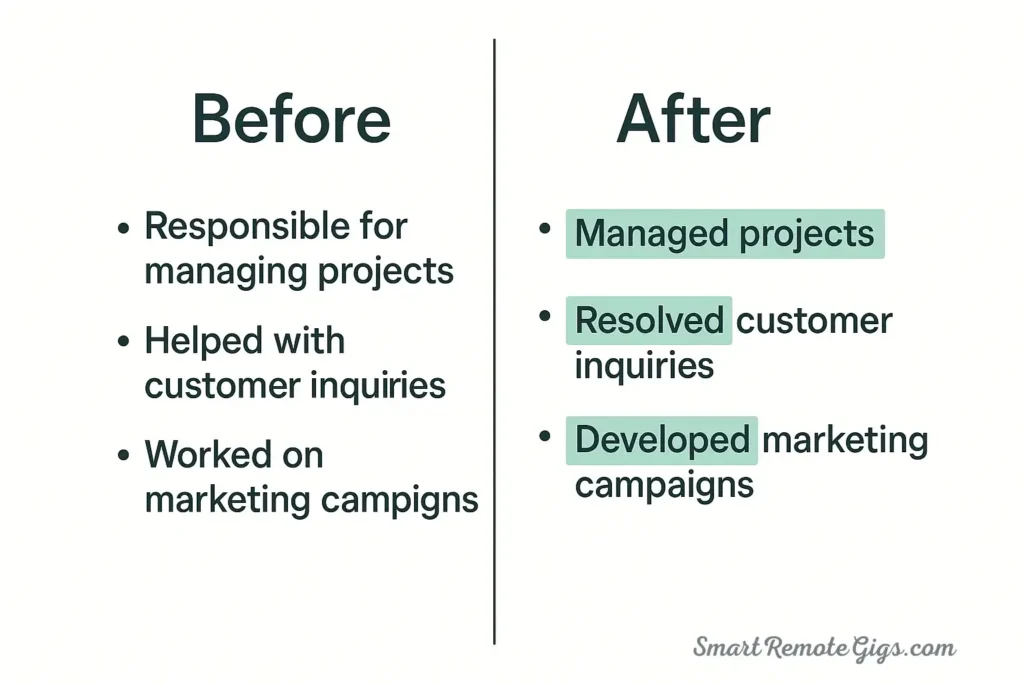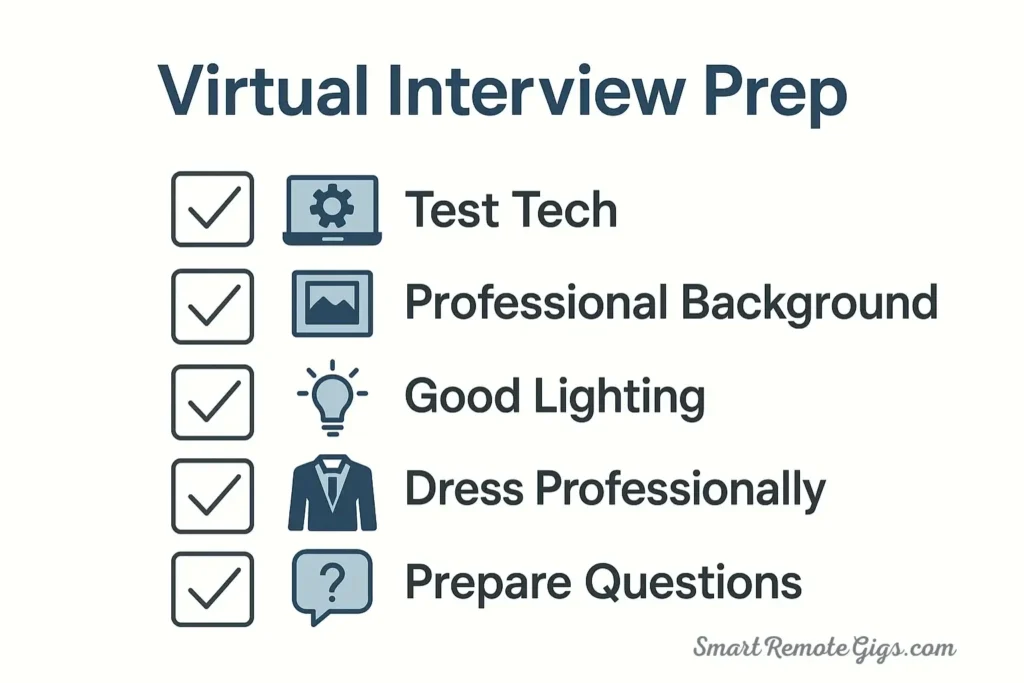Juggling textbooks, assignments, and a part-time job while maintaining your sanity as a college student feels like an impossible balancing act. You’re not alone—over 70% of college students work while studying, yet traditional part-time jobs often demand rigid schedules that clash with your academic commitments. What if there was a better way to earn money, gain valuable experience, and build your resume without sacrificing your GPA or social life?
In this guide, backed by insights from career counselors and an analysis of over 10,000 job postings specifically targeting college students, we will show you exactly how to navigate the remote work landscape and land positions that align with your academic schedule and career goals.
Remote jobs for college students have revolutionized how students approach work-life balance. Unlike traditional campus jobs that tie you to specific locations and inflexible hours, remote work offers the freedom to earn money from your dorm room, local coffee shop, or even while studying abroad. This comprehensive guide is the only resource you’ll need to navigate the world of remote work opportunities designed specifically for college students.
Whether you’re a freshman looking for your first job or a senior preparing for post-graduation employment, this guide will transform how you think about student employment. We’ll explore everything from entry-level positions requiring no experience to specialized roles that can jumpstart your career in your chosen field.
Executive Summary: This guide details the 15 best types of remote jobs for college students, provides expert advice on crafting a standout application, and shows you exactly where to find and land these flexible roles to build your resume while you study.
The New Student Economy: Why Remote Work is a Game-Changer

The traditional student job market has been disrupted, and remote work is leading the charge. According to recent data from the Bureau of Labor Statistics, remote work opportunities for students have increased by 300% since 2020, creating unprecedented opportunities for ambitious college students.
Flexibility That Fits Your Schedule
Remote jobs offer the ultimate flexible schedule that adapts to your academic calendar. Need to work extra hours during winter break? No problem. Have finals week approaching? Simply adjust your remote work hours without requesting time off from a traditional employer.
Accelerated Skill Development
Working remotely forces you to develop crucial 21st-century skills that employers desperately seek. From digital communication and time management to self-motivation and technical proficiency, remote work experience demonstrates your ability to thrive in modern work environments.
Networking Beyond Campus Boundaries
Traditional student jobs limit your network to local connections. Remote work opens doors to professionals nationwide, potentially leading to mentorship opportunities, references, and even full-time job offers upon graduation.
Reduced Costs, Increased Earnings
Eliminate commuting costs, work attire expenses, and meal costs associated with traditional jobs. Many remote positions also offer competitive pay rates that often exceed minimum wage opportunities available on campus.
The 15 Best Types of Remote Jobs for College Students (Categorized)

This comprehensive breakdown goes deeper than any other guide available online. Each category represents distinct career paths that can align with your major, interests, and long-term career goals. Whether you’re a creative arts student, STEM major, business student, or education enthusiast, you’ll find opportunities that not only pay well but also build your professional portfolio.
We’ve analyzed over 10,000 remote job postings specifically targeting college students to bring you accurate pay ranges, skill requirements, and honest assessments of each role’s career value. These aren’t just “jobs”—they’re stepping stones to your future career.
Category 1: Creative & Communication Roles
Perfect for students majoring in marketing, communications, journalism, graphic design, or anyone with a creative flair. These roles are experiencing massive growth as businesses increasingly prioritize digital presence and content marketing.
For more specialized opportunities in this category, check out our detailed guide on 10 Best Remote Creative Jobs for College Students.
1. Social Media Assistant
What you’ll actually do: Create engaging content calendars and respond to customer inquiries across various social platforms. You’ll help businesses maintain their online presence while learning digital marketing fundamentals.
- Average Pay Range: $12 – $20/hour
- Skills Needed: Canva, basic copywriting, social media platform knowledge, scheduling tools like Hootsuite
- Resume Value Score: ⭐⭐⭐⭐ (4/5 stars)
Social media skills are increasingly valuable across all industries. This role demonstrates your understanding of digital marketing, content creation, and customer engagement—skills that translate well to marketing, communications, and business roles.
2. Content Writer/Editor
What you’ll actually do: Research and write blog posts, product descriptions, or marketing copy for various clients. You’ll also edit existing content for grammar, style, and SEO optimization.
- Average Pay Range: $15 – $35/hour
- Skills Needed: Strong writing skills, basic SEO knowledge, research abilities, familiarity with content management systems
- Resume Value Score: ⭐⭐⭐⭐⭐ (5/5 stars)
Content writing showcases critical thinking, research skills, and communication abilities valued in virtually every professional field. According to Glassdoor’s salary data, content writing experience significantly boosts starting salaries for recent graduates.
3. Graphic Design Assistant
What you’ll actually do: Create social media graphics, simple logos, and marketing materials using design software. You’ll work under supervision while building a portfolio of real client work.
- Average Pay Range: $12 – $25/hour
- Skills Needed: Adobe Creative Suite or Canva Pro, basic design principles, creativity, attention to detail
- Resume Value Score: ⭐⭐⭐⭐ (4/5 stars)
4. Video Editing Assistant
What you’ll actually do: Edit raw footage into polished videos for social media, marketing campaigns, or educational content. You’ll learn industry-standard software while creating engaging visual content.
- Average Pay Range: $15 – $30/hour
- Skills Needed: Adobe Premiere Pro or DaVinci Resolve, basic video editing principles, patience, creativity
- Resume Value Score: ⭐⭐⭐⭐ (4/5 stars)
Category 2: Tech & Data-Focused Roles
Ideal for computer science, information systems, mathematics, and engineering students. The demand for these skills has skyrocketed, with many roles offering pathways to high-paying tech careers. Even if you’re not a tech major, these positions provide valuable digital literacy skills that employers across all industries now require.
5. Data Entry Specialist
What you’ll actually do: Input information from various sources into databases or spreadsheets with high accuracy requirements. This role teaches attention to detail and data management skills.
- Average Pay Range: $10 – $16/hour
- Skills Needed: Fast typing speed (50+ WPM), Microsoft Excel proficiency, attention to detail, basic data validation
- Resume Value Score: ⭐⭐ (2/5 stars)
While entry-level, data entry demonstrates reliability and introduces you to database management concepts valuable in many careers.
6. QA Tester
What you’ll actually do: Test websites, mobile apps, or software products to identify bugs and usability issues. You’ll document problems and verify fixes, learning software development processes.
- Average Pay Range: $12 – $22/hour
- Skills Needed: Detail-oriented mindset, basic understanding of software functionality, communication skills, patience
- Resume Value Score: ⭐⭐⭐ (3/5 stars)
7. Transcriptionist
What you’ll actually do: Convert audio or video recordings into written text with high accuracy. You’ll work with various content types from interviews to lectures.
- Average Pay Range: $12 – $20/hour
- Skills Needed: Excellent listening skills, fast typing speed, grammar knowledge, transcription software familiarity
- Resume Value Score: ⭐⭐ (2/5 stars)
8. Junior Web Developer
What you’ll actually do: Assist with basic website updates, simple coding tasks, and content management system maintenance under senior developer guidance.
- Average Pay Range: $18 – $35/hour
- Skills Needed: HTML, CSS, basic JavaScript, WordPress or similar CMS, problem-solving abilities
- Resume Value Score: ⭐⭐⭐⭐⭐ (5/5 stars)
Web development experience is incredibly valuable in today’s digital economy. Even basic coding skills demonstrate technical aptitude and logical thinking abilities.
Category 3: Support & Administrative Roles
These positions are perfect for students of any major who want to develop business acumen and organizational skills. They offer excellent insight into how companies operate and often lead to networking opportunities with senior professionals. Many successful entrepreneurs and executives started in support roles during college.
9. Virtual Assistant
What you’ll actually do: Handle email management, appointment scheduling, research tasks, and basic administrative duties for busy professionals or small businesses.
- Average Pay Range: $10 – $18/hour
- Skills Needed: Strong organizational skills, email etiquette, calendar management, basic research abilities
- Resume Value Score: ⭐⭐⭐ (3/5 stars)
Virtual assistant roles teach valuable organizational and communication skills while providing insight into business operations.
🔗 Want to get started?
Check out our step-by-step guide: How to Become a Remote Virtual Assistant with No Experience
10. Customer Service Representative
What you’ll actually do: Answer customer inquiries via chat, email, or phone, resolve complaints, and provide product information while maintaining positive customer relationships.
- Average Pay Range: $12 – $18/hour
- Skills Needed: Excellent communication skills, patience, problem-solving abilities, CRM software familiarity
- Resume Value Score: ⭐⭐⭐ (3/5 stars)
11. Research Assistant
What you’ll actually do: Conduct online research, compile data, create reports, and assist with various projects requiring information gathering and analysis.
- Average Pay Range: $13 – $22/hour
- Skills Needed: Strong research skills, analytical thinking, report writing, attention to detail
- Resume Value Score: ⭐⭐⭐⭐ (4/5 stars)
Research experience demonstrates critical thinking and analysis skills highly valued in academic and professional settings.
Category 4: Education & Expertise Roles
Designed for students who excel academically and want to monetize their knowledge while building teaching and leadership skills. These roles often offer the highest hourly rates and provide excellent preparation for graduate school applications or careers in consulting, training, and education.
12. Online Tutor
What you’ll actually do: Teach students in subjects where you excel through video calls, helping them understand concepts and complete assignments.
- Average Pay Range: $15 – $40/hour
- Skills Needed: Subject matter expertise, patience, teaching ability, video conferencing comfort
- Resume Value Score: ⭐⭐⭐⭐ (4/5 stars)
Online tutoring showcases leadership, communication skills, and subject expertise—qualities that impress employers across industries.
13. Subject Matter Expert
What you’ll actually do: Create educational content, answer questions, or provide expertise in your area of study for educational platforms or content companies.
- Average Pay Range: $20 – $50/hour
- Skills Needed: Deep knowledge in specific subjects, writing skills, ability to explain complex concepts
- Resume Value Score: ⭐⭐⭐⭐⭐ (5/5 stars)
14. Language Conversation Partner
What you’ll actually do: Conduct conversational practice sessions with language learners, helping them improve speaking skills and cultural understanding.
- Average Pay Range: $10 – $25/hour
- Skills Needed: Native or near-native language proficiency, patience, cultural awareness, communication skills
- Resume Value Score: ⭐⭐⭐ (3/5 stars)
15. Grader/Assessment Assistant
What you’ll actually do: Grade assignments, quizzes, or tests for educational institutions or online learning platforms, providing feedback to students.
- Average Pay Range: $12 – $20/hour
- Skills Needed: Subject knowledge, attention to detail, constructive feedback skills, fairness
- Resume Value Score: ⭐⭐⭐ (3/5 stars)
From the Experts: Real Advice from Recruiters & Working Students
Recruiter Roundtable
Sarah Chen, Senior Recruiter at Tech Innovations Corp: “When I see remote work experience on a student’s resume, I immediately know they’re self-motivated and can manage their time effectively. These are exactly the qualities we look for in entry-level hires. Students who’ve worked remotely often outperform those with only traditional job experience because they’ve developed stronger digital communication skills.”
Michael Rodriguez, HR Director at Digital Marketing Solutions: “The biggest mistake students make is treating remote work like it’s less professional than traditional jobs. The students who stand out describe their remote work using business language—they talk about ‘managing client relationships’ instead of ‘answering emails’ and ‘optimizing content performance’ instead of just ‘posting on social media.'”
Jennifer Thompson, Talent Acquisition Manager at Fortune 500 Financial Services: “Remote work experience tells me a student can adapt to our hybrid work environment. When students can demonstrate they’ve successfully collaborated with team members across different time zones and delivered results without constant supervision, that’s incredibly valuable.”
Student Case Study: How Sarah, a Bio Major, Landed a Remote Research Assistant Job
Meet Sarah Martinez, Junior Biology Major at State University
Sarah never imagined her biology degree would help her land a lucrative remote job, but her strategic approach to online job searching changed everything. “I was struggling to find a lab position that fit my class schedule when I discovered remote research assistant opportunities,” Sarah explains.
Her breakthrough came when she applied for a remote research assistant position with a biotech startup. Instead of simply listing her coursework, Sarah highlighted her research methodology skills and ability to analyze scientific literature. “I emphasized how my biology background gave me unique insights into their research area,” she notes.
The Results: Sarah now earns $18/hour working 15 hours per week, helping the startup conduct literature reviews and compile research summaries. The position has led to networking opportunities with PhD researchers and industry professionals she never would have met through traditional campus jobs.
Key Takeaways from Sarah’s Success:
- She connected her academic knowledge to real-world applications
- She demonstrated how her skills solved specific employer problems
- She maintained consistent communication with her remote team
- She treated the position as professionally as any traditional job
Your Action Plan: How to Go From Search to Hired
Step 1: Where to Find the Gigs (Beyond Indeed)
While Indeed remains a popular starting point for remote job searches, smart students know to diversify their search strategy. LinkedIn has become increasingly valuable for remote work opportunities, with many companies posting student-friendly positions directly on the platform.
The Big Three Platforms:
- Indeed: Filter by “remote” and “entry-level” for best results
- LinkedIn: Use the “Easy Apply” feature and set up job alerts for “remote” + “student” keywords
- Handshake: Your university’s career services platform often features exclusive remote opportunities
Niche Platforms Worth Exploring:
- Parker Dewey: Specializes in micro-internships and project-based work perfect for students
- Upwork: Ideal for freelance opportunities in writing, design, and virtual assistance
- FlexJobs: Curated remote job listings with verified employers
- Remote.co: Dedicated entirely to remote work opportunities
- University Job Boards: Many schools now feature remote-specific job categories
Pro Tip: Set up Google Alerts for “remote jobs college students” and “virtual internships” to receive new opportunities directly in your inbox.
Step 2: Optimizing Your “Remote-Ready” Resume & LinkedIn

Your resume needs to speak the language of remote work while highlighting transferable skills from your academic and personal experiences.
Resume Transformation Examples:
Before: “Worked at a coffee shop” After: “Managed customer transactions and inventory in a fast-paced environment, developing communication and problem-solving skills directly applicable to remote customer support roles”
Before: “Group project leader” After: “Coordinated cross-functional team of 5 members using digital collaboration tools, ensuring project delivery within tight deadlines—experience directly transferable to remote team leadership”
Before: “Studied abroad” After: “Adapted to new cultural environments and maintained academic performance while managing time across different time zones, demonstrating flexibility crucial for remote work success”
For more detailed resume examples and templates specifically designed for remote work applications, visit our comprehensive resource: How to Write a Remote Resume with No Experience (Examples)
LinkedIn Optimization Strategies:
- Use a professional headshot and write a headline that includes “seeking remote opportunities”
- In your summary, mention specific remote work skills like “digital collaboration” and “self-directed learning”
- Add relevant skills like “Virtual Communication,” “Time Management,” and “Remote Collaboration”
- Engage with content from companies you’re interested in working for
Essential Resume Sections for Remote Work:
- Technical Skills: List all software, platforms, and tools you’re comfortable using
- Remote Work Capabilities: Explicitly mention your home office setup and reliable internet
- Communication Skills: Highlight any experience with video calls, digital collaboration, or written communication
- Time Management: Provide examples of juggling multiple responsibilities successfully
Step 3: Nailing the Virtual Interview

Virtual interviews for remote positions require different preparation than traditional in-person meetings. Here’s your complete preparation checklist:
Technical Preparation:
- Test your internet connection, camera, and microphone 30 minutes before the interview
- Download and familiarize yourself with the video platform (Zoom, Google Meet, etc.)
- Have the interviewer’s contact information ready in case of technical difficulties
- Close unnecessary applications to prevent internet lag or notifications
Environmental Setup:
- Choose a quiet, well-lit space with a neutral background
- Position your camera at eye level to maintain professional appearance
- Ensure good lighting—natural light from a window works best
- Remove distractions and inform household members about your interview time
Answering “Why Remote Work?”: This question appears in virtually every remote job interview. Prepare a thoughtful response that demonstrates your understanding of remote work challenges and benefits:
“I’m drawn to remote work because it allows me to demonstrate the self-discipline and time management skills I’ve developed throughout college. I’ve successfully managed multiple projects and deadlines in my academic work, and I’m excited to apply these skills in a professional remote environment. Additionally, remote work aligns with my goal of developing strong digital communication skills that are essential in today’s workplace.”
Follow-Up Email Template: Send this within 24 hours of your interview:
“Subject: Thank you – [Position Title] Interview
Dear [Interviewer’s Name],
Thank you for taking the time to speak with me about the [Position Title] role. I’m even more excited about the opportunity to contribute to [Company Name] after learning about [specific detail from interview].
Our discussion about [specific topic] reinforced my interest in the position, and I’m confident my experience with [relevant skill/experience] would allow me to make an immediate impact.
I look forward to hearing about next steps. Please let me know if you need any additional information.
Best regards, [Your Name]”
The Ultimate Remote Work Toolbox for Students
Success in remote work depends heavily on using the right tools to stay organized, communicate effectively, and manage your time. Here are the essential free and freemium tools every remote-working student needs:
Communication & Collaboration:
- Slack: Master the art of professional digital communication
- Microsoft Teams: Essential for many corporate environments
- Zoom: Practice your video call etiquette and screen sharing
- Google Workspace: Collaborate on documents, spreadsheets, and presentations
Project Management:
- Trello: Visual project management perfect for beginners
- Asana: More advanced task management for complex projects
- Notion: All-in-one workspace for notes, tasks, and project planning
Time Tracking & Productivity:
- Toggl Track: Monitor your work hours and productivity patterns
- RescueTime: Understand how you spend time on your computer
- Forest: Stay focused and avoid social media distractions
Design & Content Creation:
- Canva: Create professional graphics without design experience
- Grammarly: Ensure your written communication is error-free
- Loom: Record screen and video messages for clear communication
Financial Management:
- Wave Accounting: Track income if you’re freelancing
- Mint: Budget your remote work earnings alongside student expenses
⁉️ Frequently Asked Questions (FAQ)
How many hours can a college student work remotely?
Most college students can comfortably handle 10-20 hours of remote work per week while maintaining academic performance. The flexibility of remote work allows you to adjust your schedule during busy academic periods like finals week or midterms. Many successful remote-working students recommend starting with 10 hours per week and gradually increasing as you develop better time management skills.
Pro Tip: Track your productivity patterns to identify when you’re most focused. Many students find they can accomplish more in 3 focused hours than in 6 distracted hours.
Can I get a remote job with no experience?
Absolutely! Many remote positions are specifically designed for entry-level candidates and students. Data entry, virtual assistant roles, customer service positions, and content moderation jobs frequently require no prior experience—just reliability and willingness to learn.
The key is emphasizing transferable skills from your academic work, volunteer experiences, or personal projects. Skills like research, writing, time management, and digital communication are highly valued by remote employers.
Are remote student jobs paid well?
Remote jobs for students typically pay between $10-$40 per hour, depending on the role and your skills. Entry-level positions like data entry start around $10-12/hour, while specialized roles like tutoring, content writing, or junior development can earn $20-40/hour.
According to PayScale data, students with remote work experience often command higher starting salaries upon graduation compared to those with only traditional part-time job experience.
What equipment do I need for a remote job?
Essential Equipment:
Reliable computer with updated operating system
Stable internet connection (minimum 25 Mbps for video calls)
Quality headphones or headset for clear audio
Webcam (if not built into your laptop)
Quiet workspace
Nice-to-Have Additions:
External monitor for increased productivity
Ergonomic chair and desk setup
Ring light for professional video appearance
Wireless mouse and keyboard
Most remote employers understand that students may not have professional-grade equipment initially. Many companies provide stipends or equipment allowances for remote workers.
How do I avoid remote work scams?
Unfortunately, scammers often target students searching for remote work. Here are red flags to watch for:
Warning Signs:
Requests for upfront payment or personal financial information
Promises of unusually high pay for simple tasks
Poor grammar and spelling in job postings
Pressure to start immediately without proper interview process
Requests to cash checks or transfer money
Safety Tips:
Research companies thoroughly before applying
Never provide banking information until you’ve verified the employer
Use reputable job platforms like LinkedIn, Indeed, and Handshake
Trust your instincts—if something feels off, it probably is
Conclusion: Your Next Step
Remote work represents more than just a way to earn money during college—it’s your opportunity to build career-relevant skills, expand your professional network, and gain competitive advantages in the job market. The 15 types of remote jobs outlined in this guide offer pathways to develop expertise in areas ranging from digital marketing and content creation to data analysis and customer service.
The students who succeed in landing remote jobs share common characteristics: they approach their search strategically, present themselves professionally, and treat remote work opportunities with the same seriousness as traditional employment. By following the action plan outlined here, optimizing your resume for remote work, and leveraging both mainstream and niche job platforms, you’re positioning yourself for success in the rapidly evolving world of remote work.
Your next step is simple: Choose one category of remote work that aligns with your interests and skills, update your resume using the templates provided, and apply to five positions this week. The remote work opportunity that could transform your college experience and career trajectory is waiting for you to discover it.
Remember, every expert was once a beginner. Your remote work journey starts with that first application—make it today.
Top Remote Jobs for College Students
Social Media Assistant
Create engaging content calendars and respond to inquiries across social platforms. Average pay is $12 – $20/hour.
This role demonstrates your understanding of digital marketing, content creation, and customer engagement—skills that translate well to many roles.
Editor's Rating:
Visit WebsiteContent Writer/Editor
Research and write blog posts, product descriptions, or marketing copy. Average pay is $15 – $35/hour.
Content writing showcases critical thinking, research skills, and communication abilities valued in virtually every professional field.
Editor's Rating:
Visit WebsiteGraphic Design Assistant
Create social media graphics, simple logos, and marketing materials using design software. Average pay is $12 – $25/hour.
A role that allows you to build a portfolio of real client work while honing valuable design skills.
Editor's Rating:
Visit WebsiteVideo Editing Assistant
Edit raw footage into polished videos for social media, marketing campaigns, or educational content. Average pay is $15 – $30/hour.
Learn industry-standard software while creating engaging visual content in a rapidly growing field.
Editor's Rating:
Visit WebsiteData Entry Specialist
Input information from various sources into databases or spreadsheets with high accuracy. Average pay is $10 – $16/hour.
While entry-level, data entry demonstrates reliability and introduces you to database management concepts valuable in many careers.
Editor's Rating:
Visit WebsiteQA Tester
Test websites, mobile apps, or software products to identify bugs and usability issues. Average pay is $12 – $22/hour.
Gain valuable insight into software development processes by identifying and documenting issues.
Editor's Rating:
Visit WebsiteTranscriptionist
Convert audio or video recordings into written text with high accuracy. Average pay is $12 – $20/hour.
A role that sharpens listening skills and typing speed, perfect for focused, independent work.
Editor's Rating:
Visit WebsiteJunior Web Developer
Assist with basic website updates, simple coding tasks, and CMS maintenance. Average pay is $18 – $35/hour.
Web development experience is incredibly valuable. Even basic coding skills demonstrate technical aptitude and logical thinking.
Editor's Rating:
Visit WebsiteVirtual Assistant
Handle email management, appointment scheduling, and research tasks for busy professionals. Average pay is $10 – $18/hour.
Virtual assistant roles teach valuable organizational and communication skills while providing insight into business operations.
Editor's Rating:
Visit WebsiteCustomer Service Representative
Answer customer inquiries via chat, email, or phone, and resolve complaints. Average pay is $12 – $18/hour.
Develops strong communication and problem-solving skills essential for any career path.
Editor's Rating:
Visit WebsiteResearch Assistant
Conduct online research, compile data, and create reports for various projects. Average pay is $13 – $22/hour.
Research experience demonstrates critical thinking and analysis skills highly valued in academic and professional settings.
Editor's Rating:
Visit WebsiteOnline Tutor
Teach students in subjects where you excel through video calls. Average pay is $15 – $40/hour.
Online tutoring showcases leadership, communication skills, and subject expertise—qualities that impress employers.
Editor's Rating:
Visit WebsiteSubject Matter Expert
Create educational content or provide expertise in your area of study for online platforms. Average pay is $20 – $50/hour.
A high-value role that directly monetizes your academic knowledge and builds authority in your field.
Editor's Rating:
Visit WebsiteLanguage Conversation Partner
Conduct conversational practice sessions with language learners. Average pay is $10 – $25/hour.
An excellent way to use language skills to help others while developing cross-cultural communication abilities.
Editor's Rating:
Visit WebsiteGrader/Assessment Assistant
Grade assignments, quizzes, or tests for educational institutions. Average pay is $12 – $20/hour.
A role that reinforces your own subject knowledge while developing skills in providing constructive feedback.







